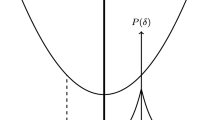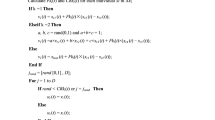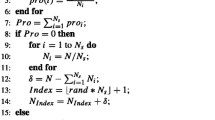Abstract
Only a few attempts in past have been made in adopting a unified outlook towards different paradigms in evolutionary computation (EC). The underlying motivation of these studies was aimed at gaining better understanding of evolutionary methods, both at the level of theory as well as application, in order to design efficient evolutionary algorithms for solving wide-range of complex problems. However, the past descriptions have either been too general or sometimes abstract in issuing a clear direction for improving an evolutionary paradigm for a task-specific. This paper recollects the ‘Unified Theory of Evolutionary Computation’ from past and investigates four steps—Initialization, Selection, Generation and Replacement, which are sufficient to describe traditional forms of Evolutionary Optimization Systems such as Genetic Algorithms, Evolutionary Strategies, Evolutionary Programming, Particle Swarm Optimization and differential evolution (DE). Then, a relatively new evolutionary paradigm, DE, is chosen and studied for its performance on a set of unimodal problems. Discovering DEs inability as an efficient solver, DE is reviewed under ‘Unified Framework’ and functional requirements of each step are evaluated. Targeted towards enhancing the DE’s performance, several modifications are proposed through borrowing of operations from a benchmark solver G3-PCX. Success of this exercise is demonstrated in a step-by-step fashion via simulation results. The Unified Approach is highly helpful in understanding the role and re-modeling of DE steps in order to efficiently solve unimodal problems. In an avalanching-age of new methods in EC, this study outlines a direction for advancing EC methods by undertaking a collective outlook and an approach of concept-sharing.
Similar content being viewed by others
References
Abbas, H.: The self-adaptive pareto differential evolution algorithm. In: Proceedings of the 2002 congress on evolutionary computation, pp. 831–836 (2002)
Ahrari A., Ahrari R.: On the utility of randomly generated functions for performance evaluation of evolutionary algorithms. Optim. Lett. 4(4), 531–541 (2010)
Ali M.M., Törn A.: Population set based global optimization algorithms: some modifications and numerical studies. Comput. Oper. Res. 31, 1703–1725 (2004)
Beyer, H.-G., Department of Computer Science: Toward a theory of evolution strategies: self-adaptation. Evol. Comput. 3(3), 311–347 (1995)
Brest J., Greiner S., Boskovic B., Mernik M., Zumer V.: Self-adapting control parameters in differential evolution: a comparative study on numerical benchmark problems. IEEE Trans. Evol. Comput. 6, 646–657 (2006)
Clerc, M.: Particle swarm optimization. ISTE Ltd, UK/USA (2006)
Deb, K.: A population-based algorithm-generator for real-parameter optimization. KanGAL Report Number 2003003
Deb K.: Multi-objective Optimization Using Evolutionary Algorithms. Wiley, Dordrecht (2001)
Deb K., Annand A., Joshi D.: A computationally efficient evolutionary algorithm for real-parameter optimization. Evol. Comput. 10(4), 371–395 (2002)
Deb, K., Padhye, N.: Development of efficient particle swarm optimizers by using concepts from evolutionary algorithms. In: Proceedings of the 2010 GECCO conference companion on Genetic and evolutionary computation, New York, NY, USA, ACM, pp. 55–62 (2010)
Fogel, D.B.: An evolutionary approach to the traveling salesman problem. Biol. Cybernet. 60 (1988)
Goldberg D.: Genetic Algorithms in Search, Optimization, and Machine Learning. Addison-Wesley, New York (1989)
Hansen N., Ostermeier A.: Adapting arbitrary normal mutation distributions in evolution strategies: the covariance matrix adaptation. Morgan Kaufmann, pp. 312–317 (1996)
Hansen N., Ostermeier A.: Completely derandomized self-adaptation in evolution strategies. Evol. Comput. 9, 159–195 (2001)
Hansen, N., Ostermeier, A.: Cma-es source code. http://www.lri.fr/~hansen/cmaes_inmatlab.html (2009)
Hirsch M.J., Meneses C.N., Pardalos P.M., Resende M.G.C.: Global optimization by continuous grasp. Optim. Lett. 1(2), 201–212 (2007)
Holland, J.:Adaption in Natural and Artificial Systems. University of Michigan Press, MI (1975)
Kenneth A.D.: Evolutionary Computation: A Unified Approach. MIT Press, Cambridge (2006)
Liu J., Lampinen J.: A fuzzy adaptive differential evolution algorithm. Soft Comput. Fusion Found. Methodol. Appl. 9(6), 448–462 (2005)
Pardalos P.M., Resende M.G.C.: Handbook of Applied Optimization. Oxford University Press, Oxford (2002)
Pardalos P.M., Romeijn E.: Handbook of Global Optimization—Vol 2: Hueristic Approaches. Kluwer, Dordrecht (2002)
Price K.V., Storn R.M., Lampinen J.A.: Differential Evolution: A Practical Approach to Global Optimization. Springer, Hiedelberg (2005)
Qin A.K., Huang V.L., Suganthan P.N.: Differential evolution algorithm with strategy adaptation for globalnumerical optimization. IEEE Trans. Evol. Comput. 13(2), 398–417 (2009)
Reklaitis G.V., Ravindran A., Ragsdell K.M.: Engineering Optimization Methods and Applications. Willey, New York (1983)
Rönkkönen J., Lampinen J.: On using normally distributed mutation step length for the differential evolution algorithm. In: 9th International Conference on Soft Computing (MENDEL 2003), pp. 11–18 (2002)
Schwefel H.-P.: Projekt MHD-Staustrahlrohr: Experimentelle optimierung einer zweiphasenduese, TTeil I. Technical Report 11.034/68, 35, AEG Forschungsinstitut, Berlin
Schwefel H.-P.P.: Evolution and Optimum Seeking: The Sixth Generation. Wiley, New York (1993)
Storn R., Price K.: Differential evolution—a simple and efficient heuristic for global optimization over continuous spaces. J. Glob. Optim. 11(4), 341–359 (1997)
Author information
Authors and Affiliations
Corresponding author
Rights and permissions
About this article
Cite this article
Padhye, N., Bhardawaj, P. & Deb, K. Improving differential evolution through a unified approach. J Glob Optim 55, 771–799 (2013). https://doi.org/10.1007/s10898-012-9897-0
Received:
Accepted:
Published:
Issue Date:
DOI: https://doi.org/10.1007/s10898-012-9897-0




